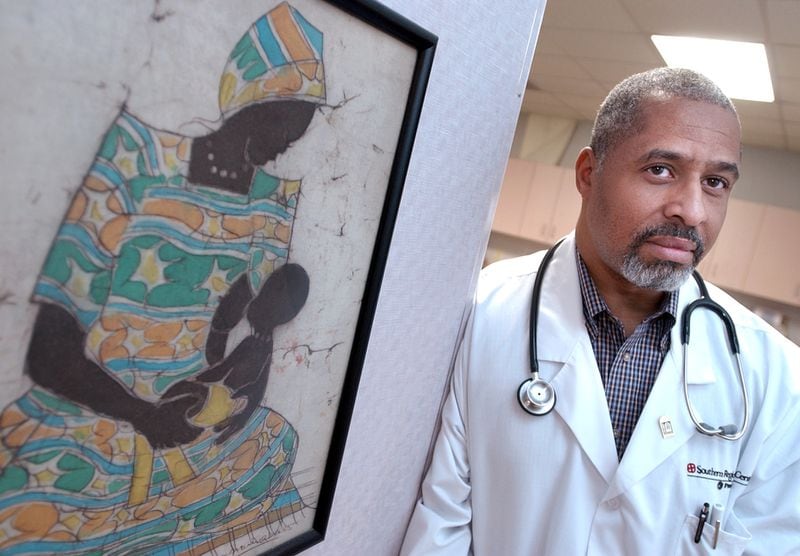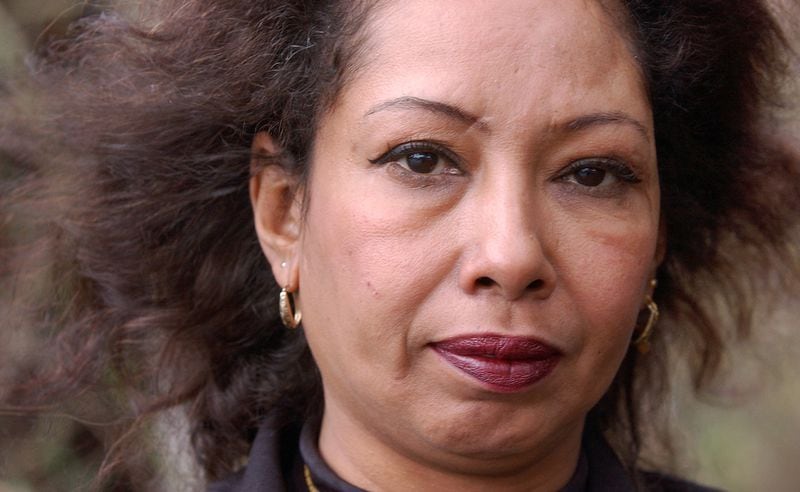NOTE: This article originally published on March 2, 2005 in the Atlanta Journal-Constitution’s Atlanta & the World section.
RELATED: Georgia man convicted of genital cutting
In downtown Atlanta recently, a mother brushed away tears while her daughter begged an immigration judge not to send her back to Kenya. The young woman's uncles had vowed to cut her genitals in an ancient rite, both women said.
Less than a mile away, another mother begged Georgia legislators to outlaw what is known as female genital mutilation. Please spare children from being maimed as her young daughter had been, she asked.
And around a dining room table in Midtown, a critically acclaimed filmmaker from Somalia recently listened as four women and an 8-year-old girl read the script for her next film. It's her own story of the life-changing day when, at age 13, her sexual organs were cut off and sewn shut.
"I'm still healing," says Soraya Mire, 43. "It's not like I'm done."
From Atlanta courtrooms to the Georgia Capitol, female genital cutting represents a wave of issues Georgians face as the state becomes home to a growing number of immigrants. The sensitive subject engenders cultural and religious debates involving female sexuality and the most intimate details about a woman's body.
It's an issue that Georgia officials, more used to debating school funding or road projects, don't especially want to talk about. But it is one they likely will hear more of. No one knows how many sexually mutilated women and girls live in Atlanta and the United States. It is a hidden, private matter, often called "female circumcision," although in some forms it is more akin to castration.
Worldwide, an estimated 2 million girls a year have their genitals cut, ranging from removal of the skin around the clitoris — the female organ corresponding to the penis — to the total cutting away of the clitoris and vaginal lips and the stitching together of the external genitalia in a procedure called infibulation.
Most of the affected girls are from Africa, where the practice remains widespread in 28 countries. But it is also found in some Middle Eastern countries, such as Israel, and in some Muslim groups in Indonesia, Pakistan and India.
Various sects of Christians, Jews and Muslims have at times embraced the custom. Today, some Muslim religious leaders continue to support the practice, saying it honors Muslim women. Others condemn it, arguing that it has no religious foundation.
"It's not the religion telling them to do this, it's custom," says Imam Plemon El-Amin, leader of one of Atlanta's largest mosques. "I see nothing within the Quran or within the practices of Prophet Muhammad whatsoever that supports female circumcision."
Importing the practice
Despite growing international opposition, immigrants are bringing the entrenched custom to Europe, Australia, Canada and the United States. In this country alone, an estimated 168,000 girls and women have undergone the procedure or are still at risk, according to the Centers for Disease Control and Prevention. The number is growing as the number of immigrants from practicing countries grows.
"Yes, it is in the community," says Laila Mohamed, who until last month was a caseworker for Refugee Family Services in Clarkston, where she worked with women from Somalia, Ethiopia and other African countries. "Most of the women still are believing in this tradition."
The millennium-old practice has been performed for a variety of reasons: to stem female sexual desire, preserve virginity or rid the body of the clitoris, believed by some to be an unhealthy organ. The cutting remains a prerequisite for marriage in many cultures.
Mohamed, who grew up in Sudan, where infibulation is common, was herself cut. Today she considers female genital mutilation a form of domestic violence and is among those who want it outlawed in Georgia.
"It's emotional abuse, sexual abuse, child abuse," she says. "They are killing their sexual senses so the girl will stay virgin until married. Why God give us this thing? We're born with it because this gives us sense. When we try to stop that in the women, that means we are killing the women."
Despite urging women to abandon the custom, Mohamed says, many plan to take their daughters back to their homelands to have the procedure done.
Typically girls are 4 to 12 years old when they are cut, often by laypeople, largely women, who frequently use unsterilized instruments and no anesthesia. The painful procedure can cause infection, bleeding and even death. Long-term physical and psychological effects can include complications in childbirth, chronic pelvic pain, scar tissue and retention of urine and menstrual blood.
In Atlanta, obstetricians and gynecologists are often the first to see the debilitating effects.
"Some patients will complain about difficulty in having intercourse," says Dr. Gulzar Kassam, who practices at Emory Crawford Long Hospital and DeKalb Medical Center, where she estimates that half her Somali and Ethiopian patients have been cut. "You see a range of deformities that can occur. Some are minor. Then there are the severe forms where almost everything has been excised and so scarred. The opening is so small."
For nearly 20 years, Dr. M. Dawud Jeffries of Southside OB-GYN Associates in Atlanta has been helping a growing number of young married Somali and West and North African women by cutting open their scarred vaginal tissue so they can engage in sex without pain.
"When I first started practicing in 1986, there were very few people with knowledge about this," Jeffries says. Even now, many doctors aren't sure what to do with a woman who has been mutilated — a term that some find offensive but is scientifically accurate when used to describe the removal of healthy tissue for no medical benefit.
Word has spread in immigrant communities that Jeffries can help with complications. But one woman recently asked if he would also "circumcise" her daughter.
"I don't know where she got her information," he says. "I said that's not something I do."
Even pediatricians have seen the effects. "I have had patients who have had it done already — older children," says Dr. Lynette Wilson-Phillips of the Decatur Pediatric Group in Clarkston, where a large number of African immigrants live. But no one has asked her to perform it, she says.
"Immigrant communities in the U.S. are quite savvy about people's attitudes about the practice," says Kathryn Yount, assistant professor of global health at Emory University. "It's possible they've been successful in driving the practice underground."
Credit: RICH ADDICKS
Credit: RICH ADDICKS
Asking for asylum
Worldwide attention to the dangerous health consequences has led some countries to ban the practice, including Ghana and Senegal. But attitudes remain fixed, and many women continue to support the custom for themselves, their daughters and their granddaughters.
The fear of immigrants importing the practice has led a number of Western countries to make it illegal, including the United States, which outlawed it in 1996. But critics say this country hasn't done enough to protect immigrant women and girls. The U.S. Justice Department has yet to approve 4-year-old proposed regulations that would spell out when to grant asylum to women trying to escape gender-related violence, including mutilation.
"There's a mix throughout the country in deciding these cases," says Karen Musalo, director of the Center for Gender and Refugee Studies at the University of California Hastings College of Law. "There has been a lack of clarity."
No one in the federal government tracks how many asylum requests are based on a woman's fear of being genitally mutilated. But Musalo's center has done its best to keep tabs on them, and in six years, there have been at least 372 requests involving female genital cutting. The center, however, knows only of cases that lawyers have brought to its attention.
After the mother and daughter from Kenya testified recently in Atlanta, the daughter's attorney advised her to withdraw her request for asylum and agree to voluntary departure. The women's testimony had conflicted, and the lawyer was afraid she would be deported for fraud.
The mother later said she had been nervous before the U.S. judge and didn't know what she was saying. But she was clear about one thing: If her daughter returned to Kenya, she would be genitally mutilated by her uncles, who want to marry her off to members of the Mungiki sect and collect her dowry.
"What I know is we cannot go home," the mother said.
The daughter was granted voluntary departure, but she and her mother don't know what to do now.
Georgia law sought
As cases bubble up around the country, a growing number of states are enacting laws to impress upon immigrants that, at least here, the practice will be treated as a crime. So far, 16 states have passed such laws. Georgia is not among them. But that seems poised to change.
A bill before the state Senate would make any form of female genital mutilation a crime punishable by five to 20 years in prison. A similar measure was derailed last year when then-Rep. Bill Heath (R-Bremen) attached an amendment to also outlaw voluntary piercing of female genitalia for cosmetic reasons — a practice Heath called not "appropriate."
This year, to avoid similar opposition, Rep. Mary Margaret Oliver (D-Decatur) has rewritten the measure, House Bill 10, to apply only to children under 18. In Georgia and around the world, female genital mutilation is increasingly framed as a children's rights issue.
"This crime is an unusual crime, but it is happening in Georgia," Oliver recently told a committee of legislators. The House unanimously passed her bill three weeks ago.
Throughout the process, Fortunate Adem, whose family emigrated from South Africa when she was 6, has been at Oliver's side. "I'm concerned that the U.S. allows immigrants and refugees to come into the country knowing they're going to bring their culture with them," says Adem, 32. "What makes the government think they're going to leave their culture behind?"
In August 2003, a DeKalb County Superior Court judge ruled that there was a preponderance of evidence Adem's then-husband, Khalid Adem, had mutilated their 2-year-old daughter, Amirah, in keeping with the tradition of his native Ethiopia. At the request of domestic violence advocates, Oliver represented Fortunate Adem in the custody hearing.
Adem testified that when she once warned her husband against cutting their child, he had hinted it was too late. A pediatrician later confirmed that the child's clitoris had been cut.
The court found in the civil action that it was more likely the father had done the cutting than the mother and awarded full custody to her. In his order, the judge wrote that, while there was no record of mutilation being practiced in South Africa, expert witnesses had testified that "up to 90 percent of Ethiopian women are so victimized" — Khalid Adem's mother and aunt among them.
Credit: RICH ADDICKS
Credit: RICH ADDICKS
'Ultimate child abuse'
Last March, in one of the first such cases in the country, Gwinnett County brought criminal charges of aggravated battery and cruelty to children against Khalid Adem. Gwinnett District Attorney Danny Porter says he intends to prosecute him on those charges, but he would prefer to have a law that specifically makes the practice a crime.
"Clearly, a black-and-white statute that says we don't care what you do in your country, it's illegal here, would make it easier," Porter says.
Adem, who is out on bond, denies that he cut his daughter, and he voluntarily took and passed a lie detector test to that effect. "Our defense is not that it's a cultural thing," says his lawyer, W. Mark Hill. "It's simply that he didn't do it."
Fortunate Adem is impatient to see her former husband prosecuted. "The point is you have a child here whose genitals have been mutilated," she says. "Somebody's responsible." It angers her that some would defend the maiming of girls' genitalia as a cultural practice better left alone.
"Her whole life has been changed," the mother says. "She is going to be traumatized psychologically. Parts of her body have been taken away from her without her consent. They need to look at this child the same way they would if she had been raped."
Her daughter's experience has given her a new mission: to persuade immigrants to put an end to the centuries-old practice. "Sometimes it takes a tragedy to become passionate about a cause," she says.
Others share her passion. In 1994,"Fire Eyes," Soraya Mire's documentary about female genital mutilation, premiered at the Sundance Film Festival in Utah.
After a desperate call for help from Fortunate Adem, the filmmaker flew here from her home in Los Angeles. She has since moved to Atlanta and is working on a film based on her own heart-rending experience of being infibulated when she was 13.
Mire understands the struggle ahead for Adem's little girl. At 43, Mire still suffers from the physical and psychological trauma.
But she is further along in her journey, and she has channeled her pain into her life's work of eradicating the genital cutting of girls.
"It is the ultimate child abuse, because you're taking a child's integrity, her humanity, her womanhood, '' Mire says. ''My whole mission in life is to help a child in pain. I just want a child to go to sleep safe at night."
About the Author








